Are you wondering if extra virgin olive oil is good for high blood pressure?
Well, it is!
Olive oil is in fact known to help lower blood pressure in addition to its many other health benefits.
Top Takeaways
- Olive oil is known to help lower high blood pressure, which can reduce the risk of heart disease.
- Olive oil contains monounsaturated fats, oleic acid, and antioxidants, which contribute to its ability to lower blood pressure and improve heart health.
- Two dietary patterns that promote lower blood pressure are the DASH diet and the Mediterranean diet, both of which emphasize the use of olive oil as a healthy fat source.
- To lower blood pressure, it is suggested to consume around 2 tablespoons of olive oil per day, replacing unhealthy saturated fats with it in your diet.
- Top Takeaways
- High Blood Pressure in North America
- Diet and Blood Pressure
- Nutrition in Olive Oil
- Olive Oil And Dietary Patterns
- How to Purchase Olive Oil
- How to Store Olive Oil
- How Much Olive Oil to Consume to Lower Blood Pressure
- Potential Side Effects of Consuming Olive Oil
- Frequently Asked Questions
- Final Thoughts
High Blood Pressure in North America
Chances are you know someone who has high blood pressure, or maybe you have high blood pressure yourself.
In Canada, approximately 1 in 5 people have high blood pressure (1) and in the United States, this number is even higher, with approximately every 1 in 2 people having high blood pressure (2).
Someone is considered to have high blood pressure when the force put on their artery walls by their blood is persistently too high (3). High blood pressure can damage your arteries and eventually lead to serious heart disease or even a heart attack.
Measurements of blood pressure are given using two numbers.
The first number represents systolic blood pressure, or the pressure on your artery walls when your heart beats. The second number represents diastolic blood pressure, or the pressure on your artery walls when your heart is at rest. A measurement of 130/80 mm/Hg or higher is too high (4).
Diet and Blood Pressure
Two common dietary eating patterns that are used to help manage blood pressure are the DASH diet and the Mediterranean diet.
They are both plant-forward diets, meaning they consist of many plant-based foods such as fruits, vegetables, and legumes, and most importantly encourage the use of olive oil. Both diets will be covered in more detail later in the article.
Nutrition in Olive Oil
Studies have shown that the various nutrients found in the olive oil help to lower blood pressure (5).
Monounsaturated Fats
You have most likely heard the terms “healthy” and “unhealthy” used in reference to different types of fat. Using this terminology, the“healthy” fats are unsaturated fats, and the “unhealthy” fats are saturated fats.
Unsaturated fats differ from saturated fats due to their chemical structure. Unsaturated fats contain at least one double bond whereas saturated fats do not contain any double bonds.
Because of this chemical structure, you can recognize unsaturated fats because they are liquid at room temperature (like olive oil), whereas saturated fats are solid at room temperature (like coconut oil.
Olive oil contains mostly monounsaturated fats, which are a type of healthy fat.
Monounsaturated fat can help to decrease bad cholesterol and increase good cholesterol, as well as help lower blood pressure (6).
Oleic Acid
Oleic acid is a type of monounsaturated fat. It has been shown to help lower the risk of coronary heart disease (7).
Olive oil is a great source of oleic acid as it makes up 73% of the oil content in olive oil (8).
Antioxidants
Antioxidants help to prevent oxidative stress, which is harmful to heart health. Oxidative stress is caused by harmful free radicals which damage our cells. One of the free radicals’ negative effects is their contribution to high blood pressure.
Consuming foods high in antioxidants, like olive oil, helps to prevent the harm caused by oxidative stress.
Olive oil contains vitamin E, vitamin K, and polyphenols which all have antioxidant properties.
We Eat it With Other Foods
Olive oil has numerous uses and is a very important component in both the DASH and Mediterranean diets.
When olive oil is consumed, it is typically eaten with other plant-based foods like salads or roasted vegetables.
Using olive oil not only means you will get the health benefits of olive oil but you will also absorb the healthy components of other plant-based foods recommended in the DASH and Mediterranean way of eating.
One common use of olive oil is as an ingredient in salad dressings. Here is an example of a salad recipe with olive oil in the dressing that fits into both the DASH and Mediterranean diets: Kale Apple Slaw With Creamy Dressing.
You can also use olive oil for roasting vegetables or even for cooking protein.
It would be beneficial to try to incorporate olive oil when eating other foods that lower blood pressure like those found in this list of 39 Foods That Lower Blood Pressure

Olive Oil And Dietary Patterns
DASH Diet
DASH is an acronym that stands for Dietary Approaches to Stop Hypertension. It focuses on eating fruits and vegetables, whole grains, healthy fats, and oils, low fat dairy products, lean meats/fish, nuts, and seeds (9). It also recognizes the importance of lowering sodium intake.
The daily servings recommended by the DASH diet are:
- 4-5 servings of vegetables
- 4-5 servings of fruit
- 7-8 servings of whole grains
- 2-3 servings of low-fat dairy products
- 2 servings of lean meat/fish
- 4-5 servings of nuts/seeds/beans
- 2-3 servings of fats and oils
As seen above, the DASH diet recommends 2-3 servings per day of fat and oils. It is important to note that the DASH diet is not a low-fat diet, but a low-saturated-fat diet. This means you should aim to replace unhealthy saturated fats with healthy unsaturated fats like olive oil.
It also recommends 4-5 servings per day of both fruits and vegetables. A great way to incorporate enough of both vegetables and fats/oils would be to use the ideas mentioned earlier. You can roast vegetables with olive oil or use them as part of a dressing for a salad.
Olive oil is also low in sodium, so it fits well into the DASH diet.
DASH Diet Recipes
Mediterranean Diet
The Mediterranean Diet is based on the diets of people who live in countries surrounding the Mediterranean Sea such as Italy, Greece, and France. The focus of this diet is to eat whole foods and avoid processed foods. This significantly helps to lower sodium intake.
The Mediterranean Diet is actually considered to be a moderately high-fat diet with olive oil being the primary fat source.
This dietary pattern has been shown to have many benefits on heart health as it was observed that people living in these geographical areas had a lower prevalence of heart disease (10).
Olive oil is an integral part of the Mediterranean way of eating, in fact, it is recommended to consume up to 4 Tbsp of olive oil a day to reap its benefits.
There are plenty of benefits of Olive Oil and The Mediterranean Diet that go beyond lowering blood pressure and improving heart health.
Mediterranean Diet Recipes
How to Purchase Olive Oil
Olive oil should be purchased in a dark glass bottle, not plastic. It also should not be bought in bulk as it is recommended that the bottle should be used within 30-60 days of opening (unless you will use it in this timeframe) (11).
How to Store Olive Oil
It is important to store olive oil correctly to preserve its polyphenol content. Recall from earlier that polyphenols are some of the antioxidants found in olive oil.
Olive oil should be stored in dark glass, which prevents sunlight from getting inside. It should also be stored in a cool place between 14-18°C, but not in the fridge (11).
It is not a great idea to store olive oil in the cupboard above your stove, as people often do, since the stove will frequently heat up the area, raising the temperature above the recommended amount.
How Much Olive Oil to Consume to Lower Blood Pressure
To lower blood pressure, it is suggested to aim to consume 2 tbsp of olive oil per day (12).
Will Olive Oil Make Me Gain Weight?
Incorporating olive oil into your diet will not cause you to gain weight if you are using it to replace unhealthy saturated fats. If you are using it as a replacement, you will still be maintaining calorie consumption.
How to Include Olive Oil in Your Diet
The easiest way to incorporate olive oil into your diet is by using it in cooking. Try replacing some unhealthy fats, such as saturated or animal fats with olive oil such as:
- When eating toast, try dipping it in olive oil and balsamic vinegar instead of adding butter
- Cook foods like vegetables, fish, eggs, and wraps with olive oil rather than butter or vegetable oil
- Make your own salad dressing, using olive oil instead of store-bought dressing
- Drizzle olive oil on pasta in place of butter or sugary sauces
- Use olive oil when baking muffins and cakes, instead of butter or vegetable oil
- Roast vegetables in olive oil
Do I Need to Drink Olive Oil?
You can drink olive oil if you want to incorporate more into your diet but are not sure how. However, it is not necessary to consume it in this way to reap its benefits.
Instead, I suggest adding it to other plant-based foods like vegetables, because olive oil makes vegetables taste so much better than if they were left plain. I find people consume more vegetables when they use olive oil to prepare them.
Potential Side Effects of Consuming Olive Oil
Increasing overall fat intake will result in an increase in calories, but as mentioned earlier, to prevent weight gain you should use olive oil as a replacement for saturated fats. This way you are not significantly increasing your calorie intake unnecessarily.
Bonus: Olive Oil Can Benefit Your Cholesterol Too!
Need another reason to start consuming more olive oil?
Since olive oil is high in monounsaturated fat and antioxidants, it helps to lower bad cholesterol, helping to prevent heart disease!
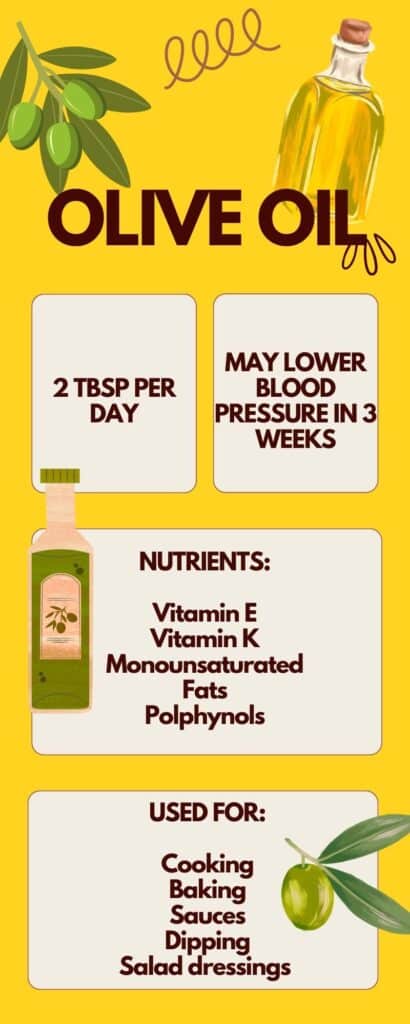
Frequently Asked Questions
How Quickly Does Olive Oil Lower Blood Pressure?
Olive oil can lower blood pressure in as little as three weeks (12).
Does Olive Oil Cause Low Blood Pressure?
Olive will not cause low blood pressure. If you are worried about your blood pressure going too low, try to prevent it by staying hydrated and making sure you are getting enough nutrients by eating a variety of foods.
Which Oil Is Good For Blood Pressure?
Olive oil is good for blood pressure. Some other oils can offer similar benefits to olive oil. Canola oil and avocado oil both contain high amounts monounsaturated fatty acids like olive oil, which may provide similar benefits regarding blood pressure.
You can read more about olive oil substitutes here: What is The Best Substitute for Olive Oil
Other Articles About Lowering Blood Pressure
Final Thoughts
As you have now read, olive oil is an impressive food that offers many health benefits. It is also a great addition to foods we already eat as it tastes great and has many uses!
If you are looking for a way to help lower your blood pressure, incorporating more olive oil into your diet is a great option.
This article was written by Siobhan Tyler, Nutrition Student, and Veronica Rouse, MAN, RD, CDE.


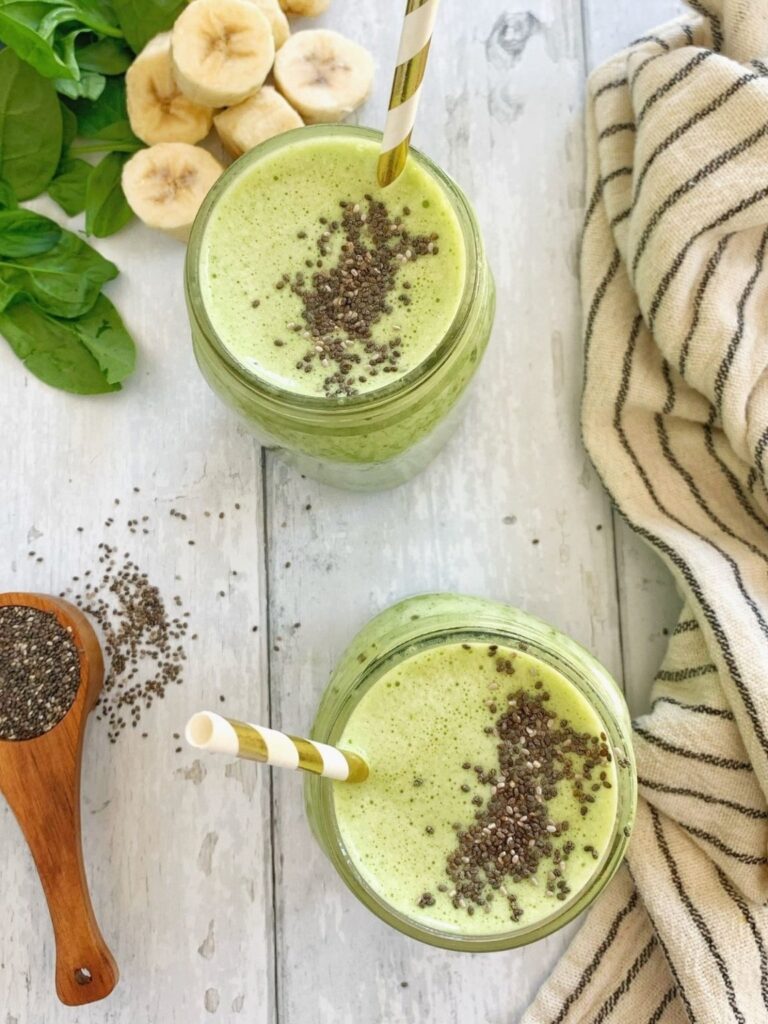
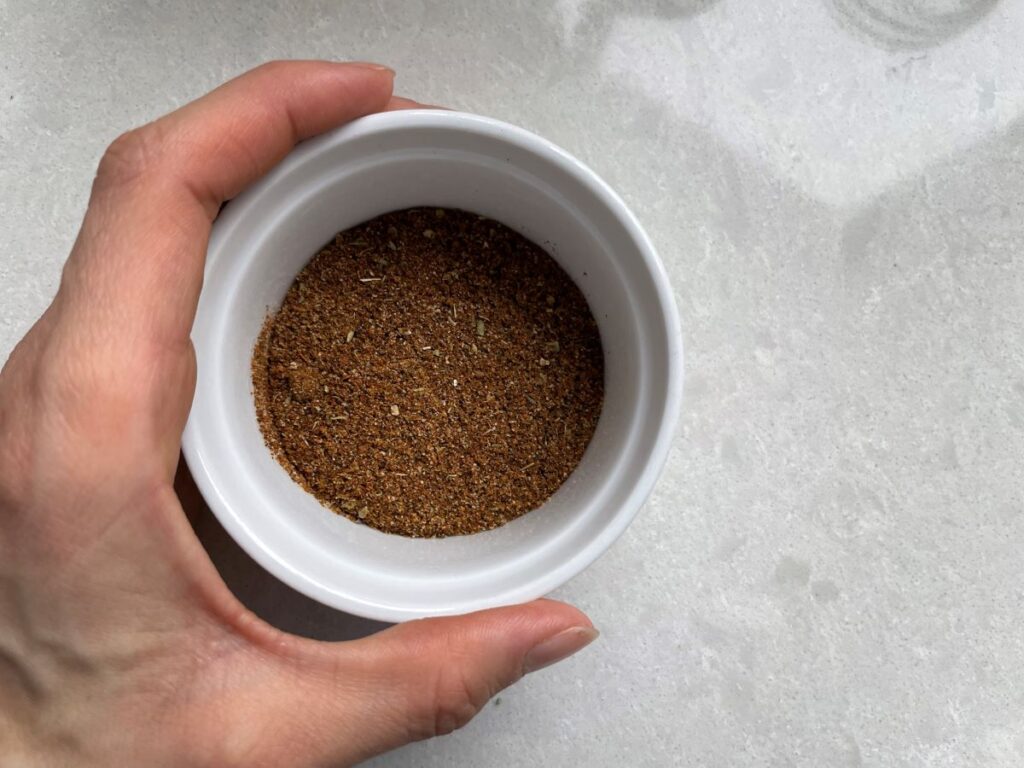
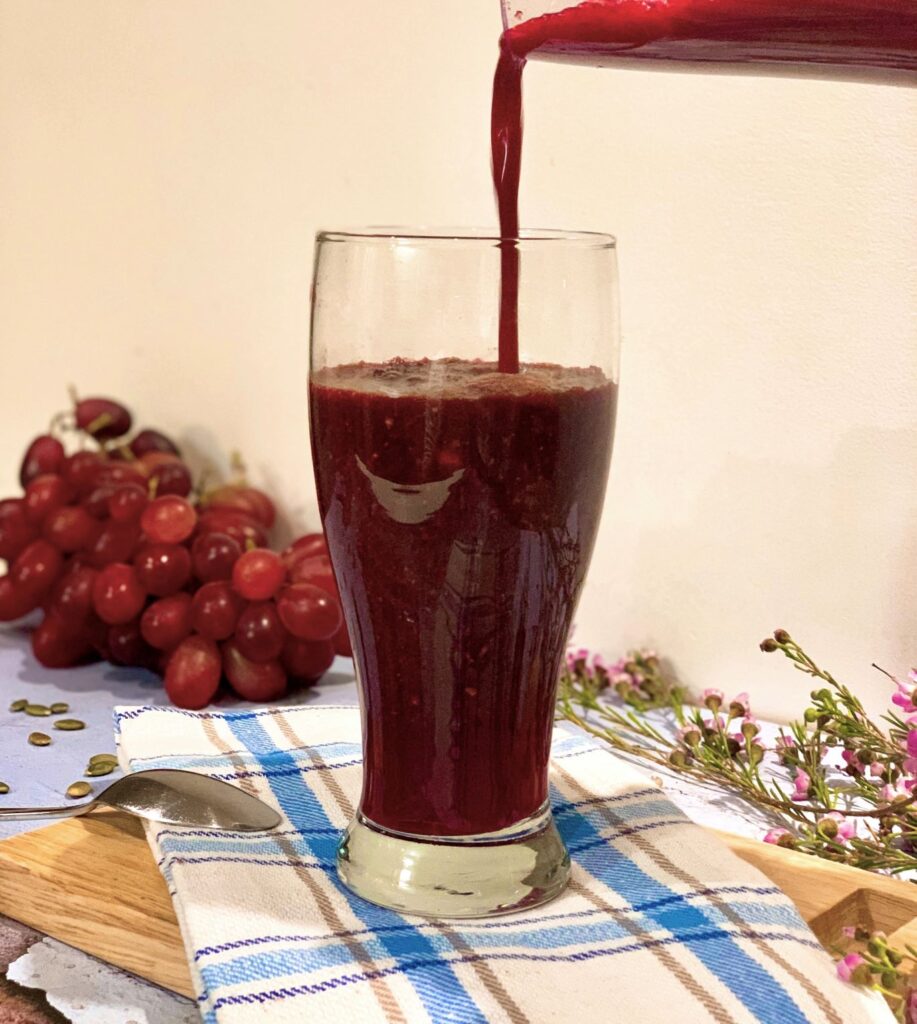
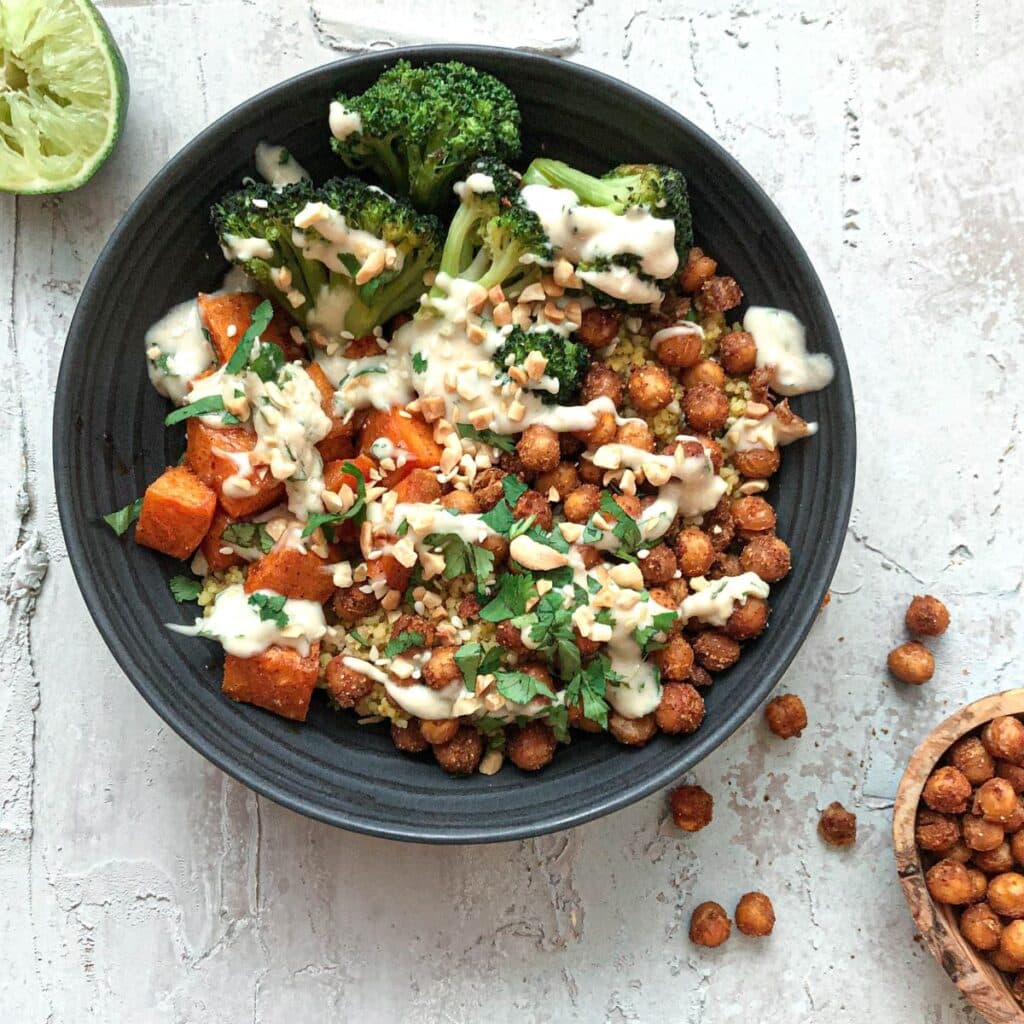
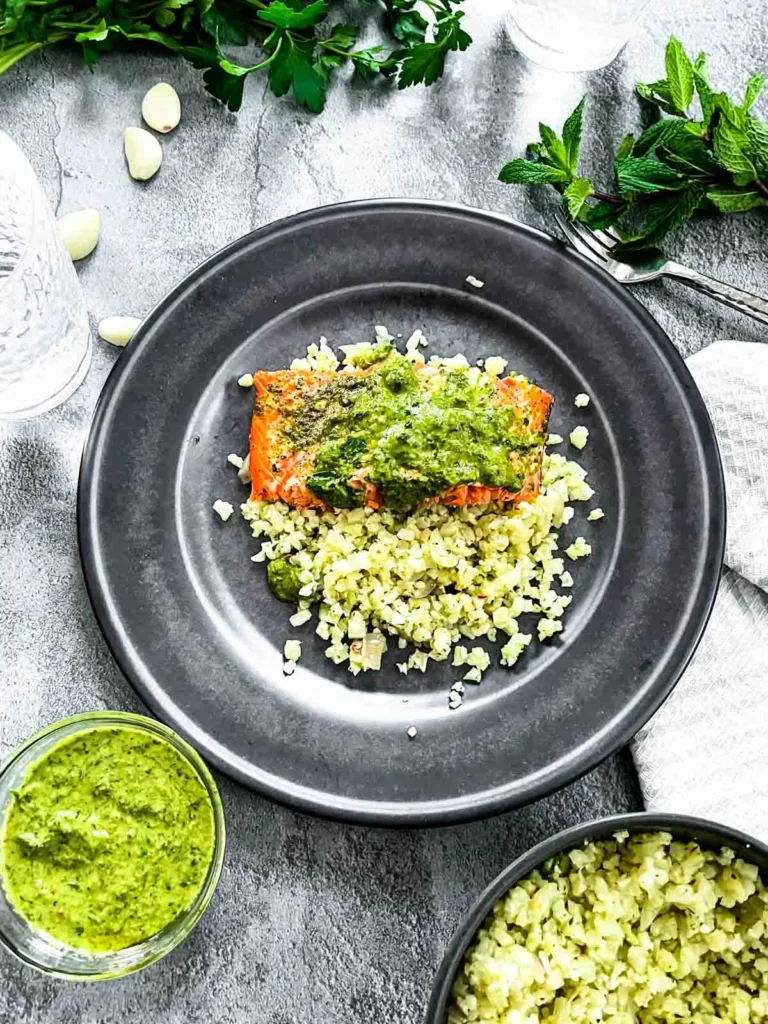
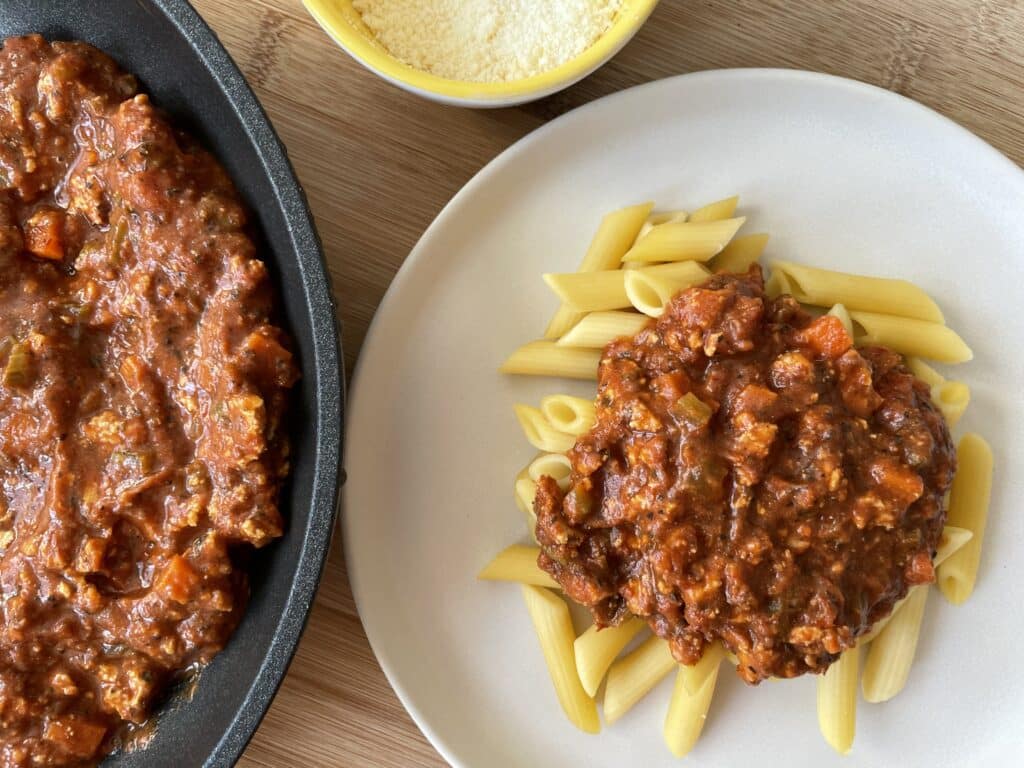
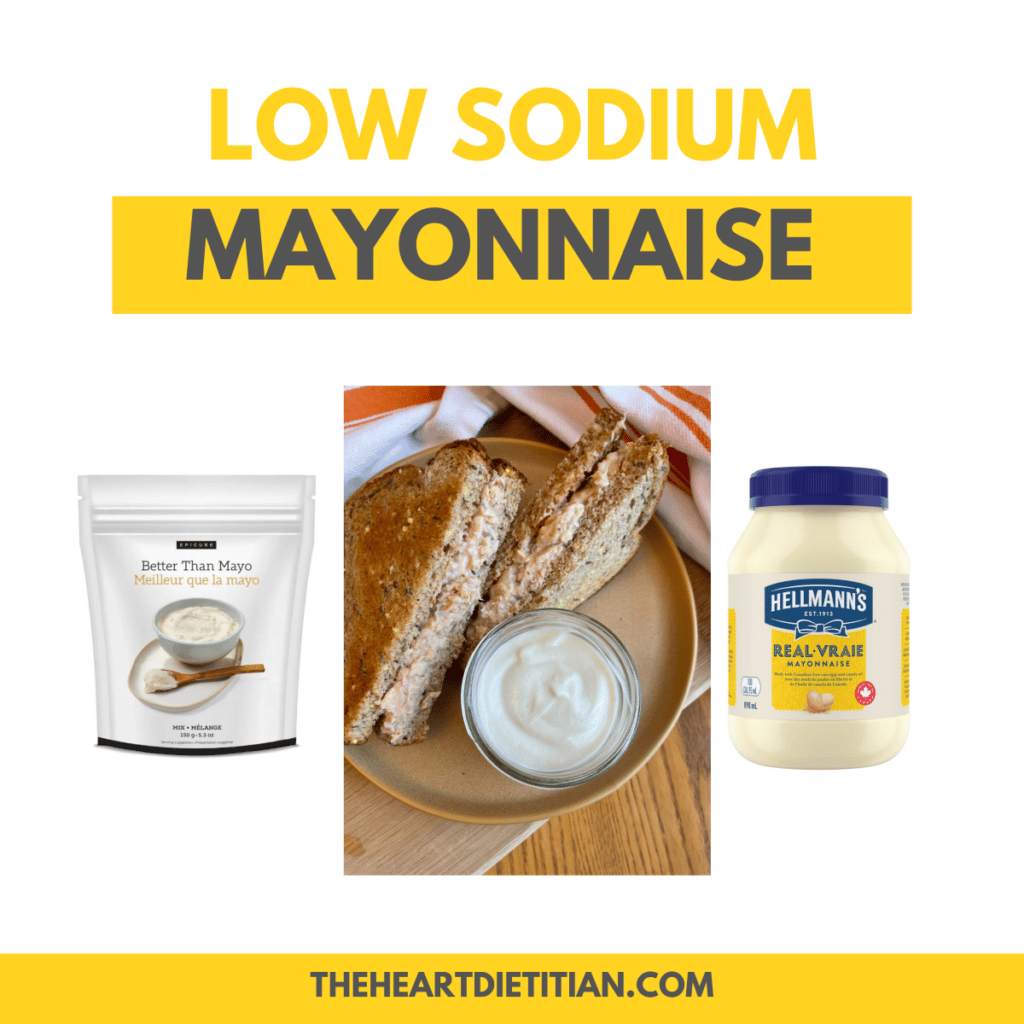
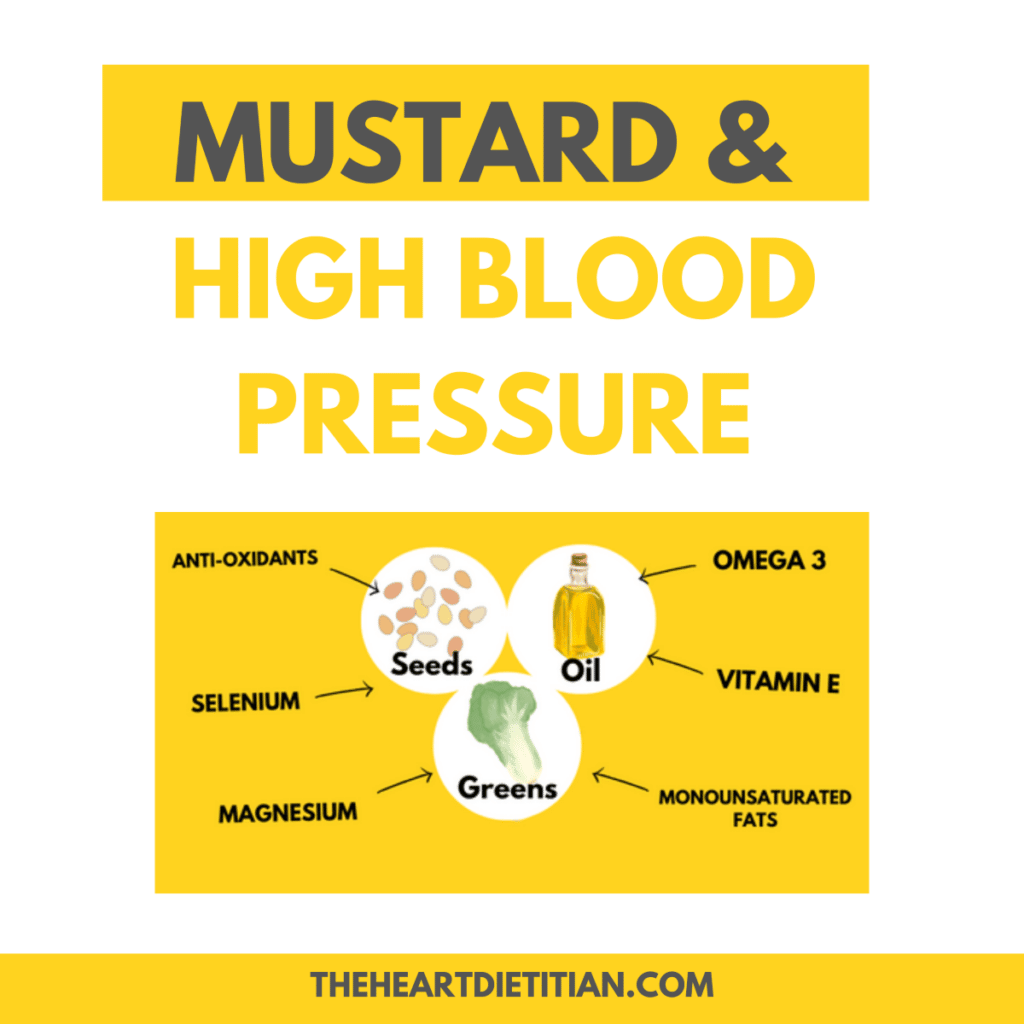
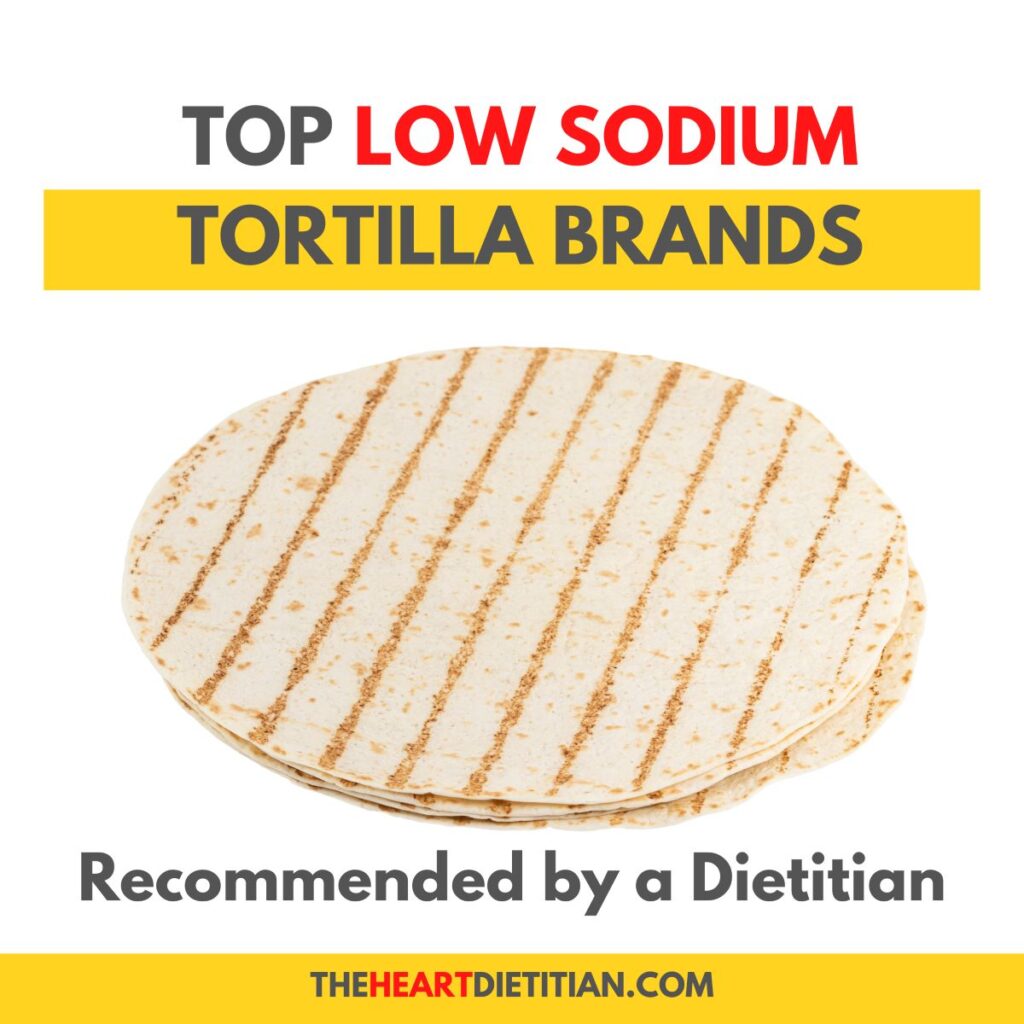
I especially loved how you delved into the nitty-gritty details about the polyphenols and monounsaturated fats in olive oil. It’s fantastic to have a resource that not only tells me what’s healthy but also explains why in a way that doesn’t make my head spin.
I’m so happy to hear that! Cheers.